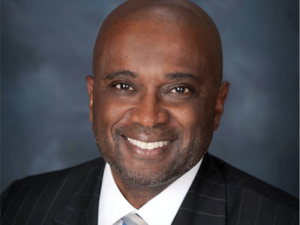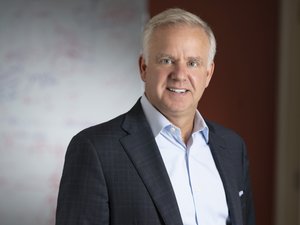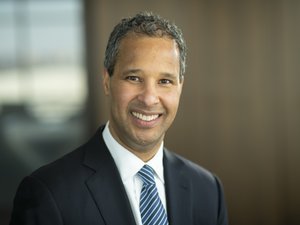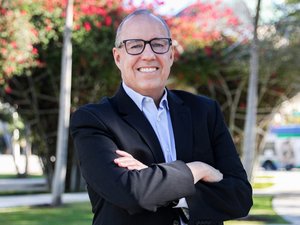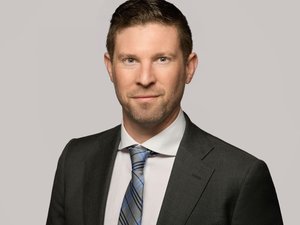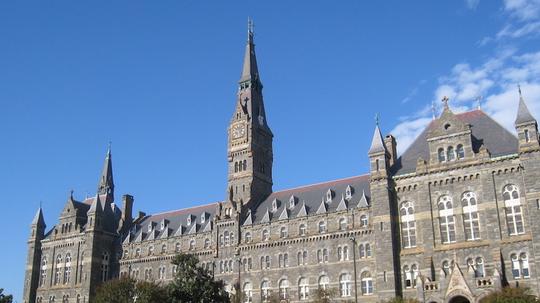
Entering Georgetown University as a transfer student, Febin Bellamy was struck by how many people work to help the university function day-in and day-out.
Like Oneil Batchelor, the janitor who Bellamy met during late nights studying at the McDonough School of Business. A few nights a week, Bellamy would hunker down in the building and Batchelor would come through. They struck up a conversation, and eventually that turned into a blossoming friendship.
This connection sparked the idea for Bellamy's first venture, Unsung Heroes. Founded in spring 2016, Unsung Heroes is a multi-campus media startup that posts stories on the little-known employees on college campuses. At Georgetown, that includes people like Batchelor or on-campus bus drivers and dining hall card swipers.
Since launching, they've grown to now include five communities: The University of Notre Dame, The University of Maryland at College Park, The University of North Carolina at Chapel Hill and Washington University at St. Louis, along with Georgetown University. Bellamy said that number will only grow.
"These amazing people around us have incredible stories that are never told," Bellamy said. "People walk by people like Oneil like they're invisible. I wanted to get to know other stories, as well."
Unsung Heroes follows a model similar to other college campus-based media groups, like HerCampus, Spoon University or The Tab. Each university has its own chapter with a campus leader and a group of contributors. Unsung Heroes approves of each location, and the national group works with on-campus administrators to green light the new location.
Bellamy said they've been basing a lot of their expansion decisions on who reaches out. For instance, after the startup was covered in The Washington Post in October, Bellamy got an on-slew of interest from students who wanted to bring Unsung to their schools.
"Students from over 40 schools around the world started reaching out to us," Bellamy said. "We just got a ton of interest."
"These amazing people around us have incredible stories that are never told. People walk by people like Oneil like they're invisible. I wanted to get to know other stories, as well."
But before Bellamy was thinking about expanding the brand, he was building it on Georgetown's campus. He enrolled in a few different marketing and business courses to flesh out the idea further. "The class was helping empower students to make a difference in the community, so I did this as a class project," Bellamy said. "I developed the business model, and the class loved it and really encouraged us to keep going, so, for the whole year, I kept doing it."
Unsung Heroes started as only a Facebook page, a lá "Humans of New York." The idea was to share not only insight into what these "heroes" do on a daily basis, but also to give a bit of a preview into what their hopes and dreams are.
Like with Umberto "Suru" Ripai, a food and service worker at one of Georgetown's on campus dining halls. Ripai left his home in Southern Sudan in 1965 and spent 21 years living in various places along west Africa, including a longer stint in Liberia. He had been in D.C. for 20 years, and not once had he been able to return to his home country to visit.
Unsung Heroes took that story and turned it into a GoFundMe page that raised around $6,000 of a $2,000 goal so Ripai could return home.
"We're not only raising awareness that these people are just as important as the president of the college and they have amazing stories that should be acknowledged and appreciated," Bellamy said, "we actually got a chance to empower students to give back."
So, it could go without saying, but Bellamy's startup struck a nerve with Georgetown's community. Unsung Heroes moved on the momentum. The team participated in the Startup Hoyas Summer Launch program this year, and Bellamy won StartupHoyas' Entrepreneur of the Year award and was a pitch competition finalist. Unsung Heroes is backed by about $10,000 in grants, scholarships and other funding.
"It was definitely a lot of support from professors, mostly just working on the idea," Bellamy said. "'How do we go beyond the surface level interviews?,' and those are the questions that professors really helped us out with."
Of course, growing a media company — especially as a student or recent grad — comes with its fair share of challenges. Bellamy has to work with university administrations to get approval, find the right students to launch it on new campuses and also coordinate the entire team. And he did that all while balancing his course work and other tasks.
"I was managing everything by myself as a solo founder. It's not something I would recommend, especially as a student entrepreneur," Bellamy said. "You want to find a core team immediately before you even begin, in my opinion."
For now though, Unsung Heroes is just looking at its expansion efforts. They're looking at how they could expand onto campuses more efficiently and also looking at interested high school chapters. And they're currently raising their seed round.
"It's not just a cool fad, we really want to make it more structured and make it a staple at each school," Bellamy said. "It should be normal to interview workers and share their stories. We should have a culture of appreciation."
